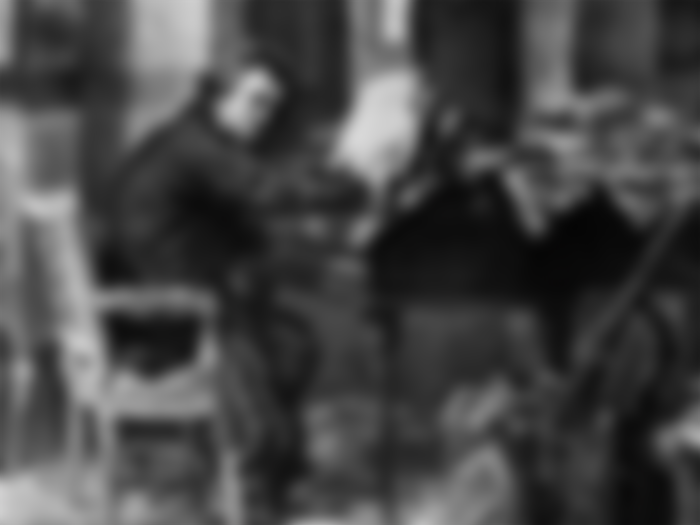Ludwig van Beethoven (1770-1827)
Ludwig van Beethoven was born on 16 December 1770 in Bonn, a small city on the Rhine and the capital of the electoral diocese of Cologne. Like his grandfather Ludwig, who was the musical director of the capella until his death (1773) and his father Johann, who died of alcoholism in 1792, the young Beethoven entered the service of the Cologne elector (elector) as a court musician from his childhood.

Christian Gottlob Neefe (1748-1788), who arrived in Bonn in 1779, became his first important teacher. When Neefe briefly left Bonn in 1782, Beethoven replaced him as organist. That same year he composed his first work (Variations on the Dressler's Anthem), followed in 1783 by three sonatas, which he dedicated to the electorate Maximilian-Friedrich. In 1784, a new electorate, II. Maximilian-Franz, brother of Joseph and Marie-Antoinette, took over. Having liberal thoughts, the prince adopted a policy of reform. Beethoven earned a regular salary as an organist, and also played alto in the orchestra. In 1785 he composed three Piano Quartets; These were only published after his death. In the spring of 1787, he met Mozart during a short trip to Vienna and returned to Bonn to see his mother before she died. In 1789, with his father completely swamped with alcohol, Beethoven took charge of the family (he had two younger siblings) and made sure that half of his father's salary went to him. Thanks to his close friend Franz Gerhard Wegeler (1765-1848), who studied medicine, he was accepted and treated like a family member by the Von Breunings, who were considered a multicultural family. In 1790, one of his first important works, Emperor II. He composed the cantata On the Death of Joseph. But the future Beethoven would rather introduce himself with some piano variations.
Beethoven, one year younger than Napoleon, was 20 years old at the beginning of the French Revolution and was influenced by it all his life. He lived mostly in Vienna from 1792 until his death. In this city, it witnessed the last moments of aristocratic musical culture as well as the debut of a more bourgeois musical culture.
Returning from a trip to London in July 1792, Haydn was passing through Bonn, thanks to Count Ferdinand von Waldstein (1762-1823), a close colleague of the electorate and a music-savvy art patron, that Beethoven met with him in Vienna, to become Haydn's student. meeting was decided. In November 1792, Beethoven went to the Austrian capital to stay in principle for only a few months (he was thinking of returning to Bonn and continuing his work), essentially staying for the rest of his life. Mozart had died a year earlier (December 1791). The lessons he took from Haydn lasted for about a year, until January 1794. The lessons have been incredibly useful. Although Beethoven returned to the counterpoint master, Johann Georg Albrechtsberger (1736-1809), the lessons he learned from Haydn's famous instrumental works (and which he continued to compose at the time) and his advice on this matter proved invaluable to Beethoven. would come out. The publication of the opus 1 Trio for Piano, Violin and Cello in August 1795 and the opus 2 three sonatas (dedicated to Haydn) in March 1796 officially made Beethoven a Viennese composer. Returning to Bonn, which had become the center of a French province, was no longer an issue. From February to July 1796, Beethoven toured Prague, Dresden, Leipzig and Berlin. Beethoven's early years in Vienna passed in very bright and high society circles, thanks to the bodyguard of many famous families of the aristocracy (Lihnovski, Lobkovic, Schwarzenberg...) and his striking success as a pianist in public, but especially in private halls. Thus, he composed many piano works during this period. He finished more than half of his 32 sonatas in 1802. From March 1795 he published the first versions of the 2nd Piano Concerto (opus 19), and from December 1795 the first versions of the 1st Piano Concerto (opus 15). His notable works include the opus 9 Triads for string instruments (1797-1798) and the opus 13 Patetic sonata (finished in the first half of 1798), among his sonatas; Two sonatas (opus 27 no: 1 and no: 2 1800-1801) titled Quasi una Fantasia should be counted; The title of the Moonlight Sonata placed on the second of these does not correspond to reality. Beethoven was late discovering the string quartet and symphony styles most associated with the Haydn name. From 1798 to 1800 Beethoven composed the first six of his 16 (or 18) string quartets (opus 18) and played his First Symphony (opus 21) on April 2, 1800, during his first self-serve concert. In a concert of the same type on April 5, 1803, his Second Symphony (opus 36), Third Piano Concerto (opus 37) and oratorio Jesus in the Olive Branch (opus 85) were performed.
After 1800, Beethoven felt the first signs of deafness that would eventually cut him off from the world. His suicide attempt during a crisis on 6-10 October 1802 was explained in the famous Heiligenstadt Will, and this work was found in the composer's papers after his death.
From 1804, when Haydn stopped composing, to 1814-1815 (the Vienna Congress), Beethoven single-handedly dominated the artistic life of Vienna. He composed many of his most popular and most played works of unprecedented length in this period. The first and most striking example of this new cycle is the Third Symphony (opus 55, 1803-1804), which was originally titled Bonaparte, and was published in 1806 as the Eroica Symphony (Beethoven states that it was dedicated to commemorating the memory of a great man). In fact, there is nothing to indicate that the Great Man Beethoven speaks of was Napoleon: the Third Piano concerto was thought to be dedicated to the Prussian prince Louis-Ferdinad, who was considered a good pianist and composer; The prince died in a battle with the French in October 1806. It should also be noted that the emphasis placed on the myth of Prometheus (no one compared Napoleon to this supreme creator) and the finale of Eroica rework a theme of the ballet Creations of Prometheus (opus 43, 1801). Waldstein (opus 53, 1803-1804) in a succession of sonatas, from symphonies to Eroica and string quartets to the three string quartets (Razumovski Quartets) numbered opus 59 (1806), dedicated to the count of Russia (later prince) and named after the count played an important role. The Sonata Appassionata (opus 57) was composed in 1805. In 1806, the Fourth Piano Concerto (opus 58), Violin Concerto (opus 61) and the Fourth Symphony (opus 60) should be counted. Apart from the first two opus 59 string quartets, which were described as difficult, these works were very successful. The first version of the opera Fidelio, which deals with the love of marriage and freedom, was made in 1805 by World War II. It was performed with an overture called Leonore. In March 1806, III. The second version, performed with the Leonore overture, followed. Around this time, Beethoven had a passionate affair with Josephine von Brunswick. However, Brunswick abandoned Beethoven because of the social class difference. Fantasy for Piano, Orchestra and Chorus (opus 80), Fifth Symphony (opus 67), famous CDO MinorÈ and Sixth Symphony (opus 68, known as Pastoral) were performed for the first time at the concert given on December 22, 1808, and in Beethoven's career. constituted a peak. This concert was a farewell concert for Beethoven, as he seriously considered leaving Vienna and working in Kassel as the capella director of the king JZrÔme Bonaparte. Archduke Rudolf (his student) and Lobkovitz and Kinsky dissuaded Beethoven by promising him a pension, but that salary would lose its value due to inflation caused by the outbreak of war. In 1809, the year Haydn died and Napoleon's second invasion of Vienna, the Fifth Piano Concerto (opus 73, Emperor) and the String Quartet No. 10 (opus 74) were performed in 1810 by Goethe's Egmont. stage music and the String Quartet No. 11 (opus 95), the Seventh Symphony (opus 92) and the Eighth Symphony (opus 93) were composed in 1811-1812.

Beethoven is in a class o his own. His music has followed me through my life. Actually, he does figure in two of my articles here, even if they are not really about his life: https://read.cash/@Mictorrani/the-greatest-victory-e440f74a and https://read.cash/@Mictorrani/the-kreutzer-sonata-how-art-inspires-to-art-which-inspires-to-art-3dced6f6
Your article is (as always) good, but if you allow me some constructive criticism, it would be easier to read if the two long paragraphs were divided into shorter ones. So long paragraphs look too massive, I'm sure that scares away some readers.